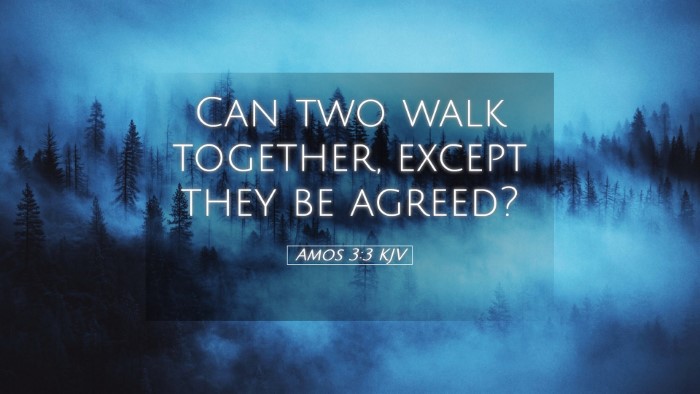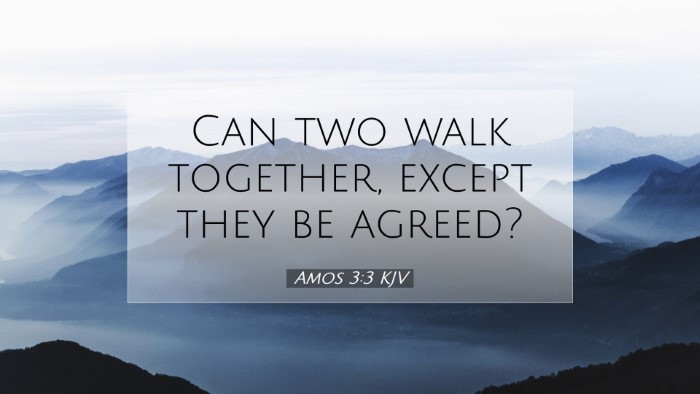Old Testament
Genesis Exodus Leviticus Numbers Deuteronomy Joshua Judges Ruth 1 Samuel 2 Samuel 1 Kings 2 Kings 1 Chronicles 2 Chronicles Ezra Nehemiah Esther Job Psalms Proverbs Ecclesiastes Song of Solomon Isaiah Jeremiah Lamentations Ezekiel Daniel Hosea Joel Amos Obadiah Jonah Micah Nahum Habakkuk Zephaniah Haggai Zechariah MalachiAmos 3:3
Amos 3:3 KJV
Can two walk together, except they be agreed?
Amos 3:3 Bible Commentary
Commentary on Amos 3:3
Verse: Amos 3:3 - “Can two walk together, except they be agreed?”
Introduction
The book of Amos stands out in the prophetic literature for its profound social justice themes and its call for true worship of Yahweh. In Amos 3:3, the prophet introduces a rhetorical question that serves as a foundation for understanding the relationship between God and Israel, and the necessity of agreement for effective fellowship. This commentary draws insights from Matthew Henry, Albert Barnes, and Adam Clarke to unpack the theological depth and implications of this verse.
Exegesis and Context
Amos, a shepherd from Tekoa, prophesied during the reign of Jeroboam II. His messages, filled with divine judgment, arose in a time of prosperity, yet also marked by social injustice and idolatry. In this context, the verse speaks to the necessity of agreement in relationship, particularly between God and His people.
Matthew Henry’s Insights
Matthew Henry emphasizes the nature of fellowship and communion. He notes:
- Walking together signifies living in harmony, indicating mutual consent and shared direction.
- The rhetorical question highlights the impossibility of true unity without agreement on foundational truths.
- This reflects the covenant relationship; God desires His people to align with His will to experience true fellowship.
Henry’s contemplations extend to the reality that such agreement must be deep-rooted in the knowledge of God’s character and divine laws.
Albert Barnes’ Commentary
Albert Barnes provides additional dimensions to the understanding of Amos 3:3:
- He interprets “walking together” as a metaphor for the combined journey of life that reflects shared values and goals.
- Barnes points out that the verse applies universally; it is not limited to the divine-human relationship but also reflects human relationships.
- He stresses that where there is divergence in belief or intent, discord necessarily follows, emphasizing the importance of unity in truth.
His insights lead to the application of this principle in church communities, where unity in doctrine is essential for spiritual growth.
Adam Clarke's Interpretation
Adam Clarke brings a theological lens to the verse, underlining the seriousness of division:
- Clarke asserts that the question serves as a warning; if Israel and God are to walk together, there must be harmony in faith and obedience.
- He elaborates on the consequences of disunity: spiritual estrangement and the loss of divine favor.
- Through his analysis, Clarke encourages reflection on personal heart issues that lead to separation from God’s presence.
Clarke's focus on the covenantal aspects deepens the understanding of the relationship's nuances, indicating that God’s desire is for His people to reflect His holiness in their lives.
Theological Implications
Amos 3:3 encapsulates vital theological truths:
- Unity and Diversity: While there can be diverse opinions, the foundational truths of Scripture must bind believers together.
- Divine Relationship: The verse invites self-examination regarding one’s agreement with God’s purposes and teachings.
- Witness to the World: The unity among believers becomes a powerful testimony to the world of God’s work in their lives.
Thus, Amos 3:3 is more than an isolated thought; it reflects the essence of the believer’s walk with God and with one another.
Practical Applications
For pastors and Christian leaders, Amos 3:3 offers several practical takeaways:
- Promote Unity: Encourage congregations to prioritize unity in core beliefs, conducting discussions that build consensus around Scriptural doctrines.
- Embrace Accountability: Create environments where individuals can engage in honest dialogue about their spiritual journeys, fostering agreements rooted in truth.
- Reflect on Personal Walk: Regularly assess one’s alignment with God’s Word, ensuring that personal beliefs and actions reflect a true walking together with Him.
Conclusion
Amos 3:3 compels us to reflect on the nature of our relationships—with God and with one another. The insights shared by Matthew Henry, Albert Barnes, and Adam Clarke invite deeper understanding and encourage a unified walk consistent with biblical teachings. As we strive for harmony in our faith community, let us remember that true fellowship is rooted in agreement with God’s revealed Word.


